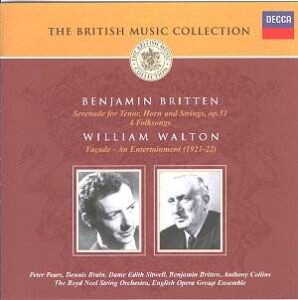 Composer: Benjamin Britten, William Walton
Composer: Benjamin Britten, William Walton
Performers: Peter Pears (tenor); Dennis Brain (horn); The Boyd Neel String Orchestra; Benjamin Britten (piano \[Folksong arrangements] and conductor \[Serenade])
Poet: Dame Edith Sitwell, Peter Pears; English Opera Group Ensemble; Anthony Collins
Record Label: DECCA 468 801-2
Total Time: 73:42
In this captivating array of Britten and Walton, a confluence of exemplary talents establishes a unique sonic experience. Britten’s prowess as a composer, pianist, and conductor is being explored, alongside Pears’ resonant tenor voice and Brain’s evocative horn-playing. The performers have demonstrated intriguing synergy in elucidating the intricacies of Britten’s music.
The seminal “Serenade for Tenor, Horn & Strings Op.31” is meticulously rendered, enhancing the masterful interplay between the human voice and the horn. Pears’ expressive tenor and Brain’s riveting horn dialogues encapsulate an emotional landscape ranging from tranquil pastoral motifs to frenzied nocturnal episodes. The Boyd Neel String Orchestra diligently undertones the textures, which elicits an engulfing depth in Britten’s composition.
In the selection of Folksong arrangements, Britten’s refined touch on the piano unravels an enchanting musical narration, breathing new life into the traditional tunes. Pears’ tonal nuances, coupled with Britten’s refined harmonies, create an immersive soundscape. “The Last Rose of Summer” and “Avenging and Bright” stand out, their melodic ardor eliciting profound emotional resonances.
The chronological jump from the 1940s to 1953 for Walton’s “Façade: An Entertainment” might feel disjunctive to the listener. However, the innovative orchestration and Sitwell’s engaging recitations bridge this temporal gap, making it a fitting conclusion to the record.
Recorded over a span of two decades, the audio quality varies but does not detract from the overall charm. DECCA rightfully celebrates Britten’s and Walton’s creative legacies while paying homage to the formidable talents of Pears, Brain, and others.
All in all, this record is not just a musical journey, but also a historical voyage into the evolution of English music in the mid-20th century. It offers the listener an opportunity to delve into their artistic world, inhabited by the prevalent cultural, societal, and emotional landscapes of their time. This aggregation of works makes Britten and Walton accessible to both seasoned listeners and those being initiated into their oeuvre. For that, DECCA’s compilation deserves to be commended and explored.
